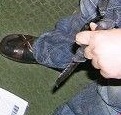Metrowest Daily News
In 2001, Harry Markopolos repeatedly warned the authorities about Bernie Madoff. No one listened. Only a serious downturn in the economy led to Madoff's downfall. It's not a Ponzi scheme, but once again, no one is listening and the red flags are everywhere. This time the victims are our very young, innocent children in the millions. Today, children as young as 2, are being prescribed powerful anti-psychotic medications. Side effects include tics, drooling, and incessant eating. Some children have gained up to 100 pounds and often progress to becoming diabetic.
Virtually nothing is known about the long-term impact of these medications. And no one seems to care. Certainly not the drug companies pushing these drugs, nor the doctors who have been coerced by the pharmaceutical industry and panicking parents alike into prescribing them. The increase in the use of anti-psychotics is directly tied to the rising incidence of one particular diagnosis, bipolar disorder. Experts estimate that the number of kids with this diagnosis is now more than one million and rising, making it more common than autism and diabetes combined. To treat it, doctors are administering medications that have yet to be approved for children. Mothers are legally medicating their two-year-olds with Risperdal to quiet their tantrums, Trileptal to stabilize their moods, and Clonidine to help them sleep.
This is not the old story about ADD or ADHD and the use of Ritalin or other approved drugs in use since the 1970's. This is not about helping the child who fidgets and can't concentrate in their elementary school classroom. This is about tens of thousands of energetic, outgoing, healthy, and normal 3- and 4-year-olds who just won't sit still in Mommy and Me. It is those children who have now been diagnosed with a new and controversial diagnosis - Childhood Bipolar Disorder.
On Sept. 4, 2007, The New York Times stated that studies in the 1970s and 80s concluded bipolar disorder was rare in children, but between 1994 to 2003, there was an astounding 40-fold increase in the number of children diagnosed with bipolar disorder.[...]
In 2001, Harry Markopolos repeatedly warned the authorities about Bernie Madoff. No one listened. Only a serious downturn in the economy led to Madoff's downfall. It's not a Ponzi scheme, but once again, no one is listening and the red flags are everywhere. This time the victims are our very young, innocent children in the millions. Today, children as young as 2, are being prescribed powerful anti-psychotic medications. Side effects include tics, drooling, and incessant eating. Some children have gained up to 100 pounds and often progress to becoming diabetic.
Virtually nothing is known about the long-term impact of these medications. And no one seems to care. Certainly not the drug companies pushing these drugs, nor the doctors who have been coerced by the pharmaceutical industry and panicking parents alike into prescribing them. The increase in the use of anti-psychotics is directly tied to the rising incidence of one particular diagnosis, bipolar disorder. Experts estimate that the number of kids with this diagnosis is now more than one million and rising, making it more common than autism and diabetes combined. To treat it, doctors are administering medications that have yet to be approved for children. Mothers are legally medicating their two-year-olds with Risperdal to quiet their tantrums, Trileptal to stabilize their moods, and Clonidine to help them sleep.
This is not the old story about ADD or ADHD and the use of Ritalin or other approved drugs in use since the 1970's. This is not about helping the child who fidgets and can't concentrate in their elementary school classroom. This is about tens of thousands of energetic, outgoing, healthy, and normal 3- and 4-year-olds who just won't sit still in Mommy and Me. It is those children who have now been diagnosed with a new and controversial diagnosis - Childhood Bipolar Disorder.
On Sept. 4, 2007, The New York Times stated that studies in the 1970s and 80s concluded bipolar disorder was rare in children, but between 1994 to 2003, there was an astounding 40-fold increase in the number of children diagnosed with bipolar disorder.[...]





